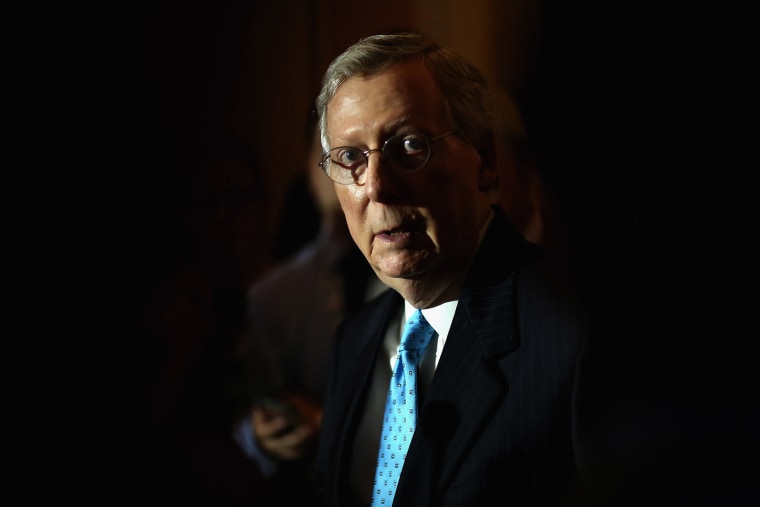Exactly one year ago this week, Senate Republicans changed the chamber's rules, executed the so-called "nuclear option" to prohibit filibusters of Supreme Court nominees, and confirmed Neil Gorsuch to the high court.
Senate Majority Leader Mitch McConnell (R-Ky.) told reporters shortly before the confirmation vote, "As I look back on my career, I think the most consequential decision I've ever been involved in was the decision to let the president being elected last year pick the Supreme Court nominee."
A year later, his opinion has not changed.
McConnell said once again that the most important accomplishment, in his mind, of Donald Trump's administration so far has been the number of conservative judicial appointments the president has gotten through."I believe that's the most important thing we're doing," the majority leader said. "You've heard me say before that I thought the decision I made not to fill the Supreme Court vacancy when Justice Scalia died was the most consequential decision I've made in my entire public career. The things that will last the longest time -- those are my top priorities."
To be sure, McConnell's assessment is factually correct. I've long believed the most serious consequences of the Trump era are the ones that aren't easily changed. Health care benefits can be restored, alliances can be rebuilt, and tax breaks can be scrapped, but on issues like the climate and the courts, the effects of Republican governance will be felt by millions of people for generations.
In fact, I'm glad, in a way, that the Senate GOP leader appreciates the scope of his actions. After all, McConnell did something few Americans in history can credibly claim: he stole a Supreme Court seat and got away with it.
As we discussed after Gorsuch's confirmation vote, when Justice Antonin Scalia died, then-President Barack Obama nominated Merrick Garland, a center-left, compromise jurist to fill the vacancy, which opened the door to a historic opportunity, unseen in recent decades: the Supreme Court could finally stop drifting towards the right.
McConnell instead decided to impose an unprecedented high-court blockade, gambling that Americans might elect a Republican president and Republican Congress.
The gamble was very “consequential,” indeed. McConnell stole a Supreme Court seat from one administration and handed it to another. Instead of a center-left judge working alongside a conservative minority on the court, we have yet another conservative majority -- this time with Neil Gorsuch, who's only 50, and who’s likely to serve for decades.
I tend to think of this story as a scandal that’s never really fully been appreciated as one. Just after the election, Sen. Jeff Merkley (D-Ore.) told MSNBC’s Chris Hayes that Senate Republicans’ treatment of a qualified, moderate jurist was effectively a political crime. A Supreme Court seat, the Oregon senator argued, was “stolen from the Obama administration and the construct of our Constitution. And it’s being delivered to an administration that has no right to fill it.” The American people, Merkley added, need to “understand that this is the theft of the court.”
A year later, the burglar is impressed. I suppose that's to be expected: if you pulled off the heist of the century, you'd probably pat yourself on the back, too.
